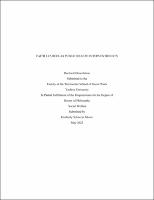Please use this identifier to cite or link to this item:
https://hdl.handle.net/20.500.12202/8972| Title: | Faith leaders as public health interventionists |
| Authors: | Lane, Shannon Vyshedsky, Christine Flaherty, Hanni Gideon, Lior Moore, Kimberly Schnecia |
| Keywords: | faith leaders health belief model interventionists public health transtheoretical model of change |
| Issue Date: | 30-May-2023 |
| Publisher: | Yeshiva University |
| Citation: | Moore, K. S. (2023, May 30). Faith leaders as public health interventionists (Publication No. 30524544) [Doctoral dissertation, Yeshiva University]. PDTG |
| Series/Report no.: | Wurzweiler School of Social Work Dissertations;Publication No. 30524544 |
| Abstract: | This study investigated how faith leaders developed and changed health promotion programs at their institutions. Data collected provided a foundation for understanding how faith leaders discerned their roles as influential when addressing the social determinants affecting population health. Additionally, the data described how faith leaders identified and prioritized health promotion services to implement at their respective faith institutions. This study also highlighted how faith leaders understood their legitimacy as active change agents in public health and clearly outlined the structural supports needed to successfully evaluate, improve, and expand their service delivery systems of care. This evaluation of principle and practice further directed an exploration into the challenges of distributive justice under the faith organizational umbrella. Data was analyzed through memoing, concept, and in-vivo coding to support the organization and categorization of the five themes which emerged from the data. These themes were broken into two categories: Category (A): Core functions of a faith leader, which included (1) Influential roles in public health and (2) Personal experiences motivated organizational changes. Themes associated with Category (B) included: (1) Obligation to become involved in public health; (2) Challenges with health promotion program development, implementation, and sustainability; (3) Public health as a social justice initiative. Findings from this research revealed that faith leaders regularly interfaced across the complexities of the public health landscape and understood their roles to be essential, influential, and diverse. Faith leaders spoke to the urgency of their involvement across social issues including, but not limited to, poverty, food insecurity, mental health, and physical health of people and communities. Furthermore, faith leaders expressed real challenges with gaining access to fiscal and administrative resources needed to support the development and sustainability of health promotion programs at their institutions. The implications from this study were examined with an emphasis on social work practice, education, policy changes, and future research. |
| Description: | Doctoral dissertation, PhD / OpenAccess |
| URI: | https://hdl.handle.net/20.500.12202/8972 https://ezproxy.yu.edu/login?url=https://www.proquest.com/dissertations-theses/faith-leaders-as-public-health-interventionists/docview/2830119081/se-2?accountid=15178 |
| ISBN: | 9798379740696 |
| Appears in Collections: | Wurzweiler School of Social Work: Dissertations |
Files in This Item:
| File | Description | Size | Format | |
|---|---|---|---|---|
| Kimberly Moore Dissertation KM 5-30-23- RESUBMISSION (1) OA.pdf | 1.3 MB | Adobe PDF |  View/Open |
This item is licensed under a Creative Commons License

